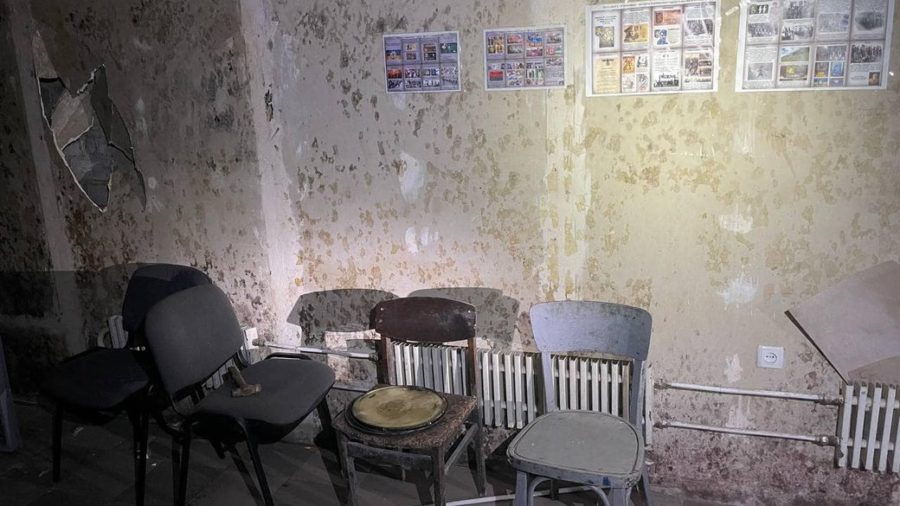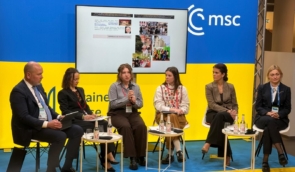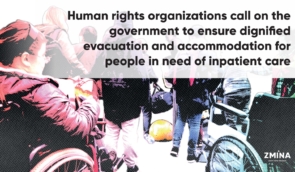ZMINA submitted input on sexual torture used by Russian units to the UN Special Rapporteur on torture
Human Rights Centre ZMINA submitted input on the prevalence of sexual torture used by Russian units in the temporarily occupied territories of Ukraine against both men and women to the UN Special Rapporteur on torture.
 The torture chamber in Balaklia. Credits: Dmytro Lubinets / Facebook
The torture chamber in Balaklia. Credits: Dmytro Lubinets / FacebookThe provided information is based on a data analysis reported by victims and witnesses of torture. The statements were obtained with in-depth interviews based on international standards during 13 monitoring visits to de-occupied settlements from November 20, 2022, to December 4, 2023 and via remote interviews.
Zmina documented 74 cases of torture and ill-treatment in Zaporizhzhia, Kharkiv, Kyiv and Kherson regions (68 men and 6 women). Of them, 18 cases of sexualized torture, 11 cases of threats of sexual violence, including 1 threat of rape against a man, as well as 3 cases of forced nudity were recorded.
All the women ZMINA interviewed indicated that the detention, personal search, collection of so-called medical samples, interrogations and other investigative actions were carried out with them by men. One of the women was blackmailed by the perpetrators saying that they would rape her daughter during her detention. One of the interviewed men also reported that he had received threats of rape against himself and other detainees. One of the women who was subjected to electric shock torture had wires attached to her body, including to her breasts.
ZMINA also documented the testimony of a civilian man from the Kherson region, who wished to remain anonymous. He reported that during an interrogation, which took place in August 2022 in the premises used as a place of detention for civilians, he was subjected to sexual torture by representatives of the FSB of the Russian Federation, who hid their faces under masks.
The interviewees perceived all these actions and threats as a real danger of the use of sexual violence as a way of influencing their behaviour, and this caused strong consequences in the field of their psychological health.
However, there are several law enforcement issues related to the investigation of sexual torture at the national level in Ukraine:
- Due to the high workload of investigators and the fact that CRSV is a highly latent crime, victims often report the crime too late and, as a result, evidence is lost or distorted.
- There is a lack of expertise at the local level.
- The Ukrainian criminal legislation on CRSV and the practice of its application do not provide for the provision of the status of a “victim of a crime” for family members of those who suffered such violence and persons dependent on them.
- Under the requirements of the Criminal Procedure Code of Ukraine, suspicions published on the website of the Office of the Prosecutor General may contain the real names of victims of CRSV, who would not want to disclose such information.
- Under the provisions of Article 438 of the Criminal Code and the corresponding norms of Procedural Law, the trial is not automatically closed to the public which can re-traumatize victims.
Therefore, human rights defenders provided a few recommendations:
- To change the criminal legislation and the practice of its application in Ukraine and to interpret the concept of a “victim” of the crime of CRSV more broadly: it has a negative impact on the entire family, not only on a specific woman or man.
- To ratify the Rome Statute to bring the criminal legislation into line and provide an opportunity to qualify cases of the use or threats of sexual torture against civilians.
- To bring the legislation on the protection of personal data of CRSV victims into compliance with international standards;
- To continue working with international partners on implementing international standards for the investigation of CRSV.
The Human Rights Council’s Special Procedures mandate undertake country visits; act on individual cases and concerns of a broader nature by sending communications to States and other actors; conduct thematic studies and convene expert consultations; contribute to the development of international human rights standards; engage in advocacy; raise public awareness; and provide advice for technical cooperation. UN Special Rapporteur on torture is one of the Special Procedures mandates.
If you have found a spelling error, please, notify us by selecting that text and pressing Ctrl+Enter.















